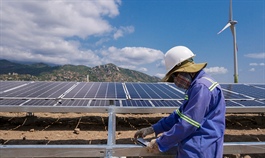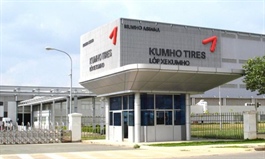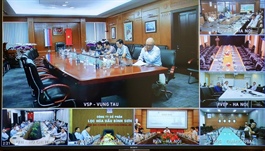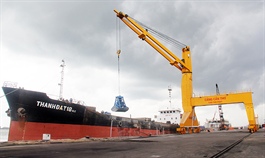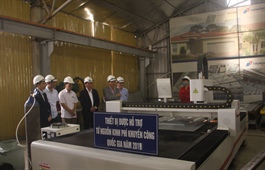How GE helps decarbonization in Vietnam?
How GE helps decarbonization in Vietnam?
Technology and utilizing operational benefits are the key factors enabling the multinational firm to serve dozens of power plants in Vietnam.
Vietnam, with annual power demand growth of roughly 10%, requires significant improvements in energy efficiency, emission intensity together with national energy mix restructuring for low-carbon economic growth.
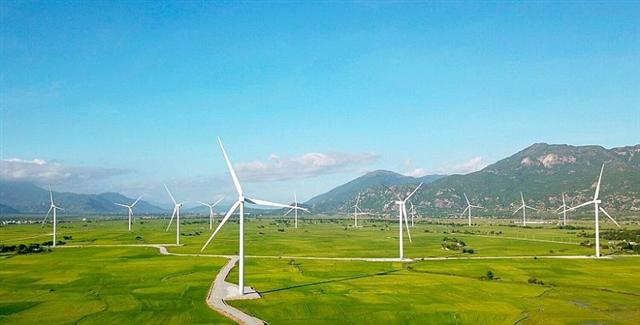
Wind farm in Vietnam's Ninh Thuan Province. Photo: GE Renewable Energy
|
To make a transition towards greener economic growth, intensified investment in renewable energy become indispensable as energy intensity over the last decade was the only negative driver resulting in the slowdown of carbon emissions in the country.
The broader engagement of GE in green energy in Vietnam has contributed partly to the country’s power transition as the US-based company now generates up to 30% of Vietnam’s power with a GE fleet of nearly 30 gas turbines, servicing over 10 power plants and projects.
GE Spokesperson Som Shantanu, Regional Engineering Director, GE Gas Power, said there is not a one-size-fits-all technology solution for decarbonization but there’s significant opportunity in the technology space, with solutions such as GE’s HA heavy duty gas turbine and aeroderivative gas turbines.
He shared that as the optimum choice for a specific region or country depends on many factors namely fuel availability, pricing and security, land constraints, GE’s policy reform play an important factor towards decarbonization.
The solutions are aimed (1) to measure and incentivize reductions in power sector carbon intensity; (2) to enable transparency and predictability allowing lifecycle economics to drive investment decisions factoring in a cost of carbon in some form; (3) establish market structures that value energy, flexibility and dependable capacity separately to encourage the optimum mix of technologies in an affordable and practical way; (4) reward R&D, innovation, and private risk taking; (5) encourage the free flow of goods and ideas consistent with the principles of the World Trade Organization; (6) reflect national and local circumstances; (7) set realistic timelines for reduction effort.
Role of gas
Som Shantanu said gas will play a significant role in the power mix as the country looks to reduce coal power development, noting that the development of new gas capacity depends on availability of natural gas from new domestic fields and new liquefied natural gas (LNG) terminals.
The government is looking at integrated LNG to Power projects to accelerate development as opportunities in current LNG to Power projects are significant and GE is currently collaborating with local partners in this space.
GE is working with local partners in the development of several LNG-to-power projects, under the current PDP, for example, the GENCO3 and GE Long Son LNG-to-power project, 3600-4500 MW, under which we will supply our HA gas turbines.
In addition, the company’s repair and manufacturing capabilities through Phu My repair facility and Dung Quat HRSG manufacturing plant enable it to largely support the country to address its energy needs, the executive emphasized.
Utilizing operational benefits
GE recognizes that to remain relevant in today’s power market, engineering, procurement, and construction (EPC), plant operators and industries globally and in Vietnam, it must prioritize key operational benefits to drive business investment and help them remain competitive in this ever-changing environment.
While the upfront cost may appear to be higher, GE is able to help customers achieve efficiencies throughout the entire lifecycle, it includes.
Increasing competitiveness through increased efficiency: It is aimed to help customers be ready to capture every opportunity to generate revenue, our technology provides high efficiency which drives lower operating costs and higher margins, fast starts and fast ramp-ups to dispatch power fast, and provide the optimum capacity in periods of high demand. For example, GE’s world-record setting HA technology is capable of >64% net combined-cycle efficiency.
Operational flexibility: This is critical for gas turbines that complement renewable energy as it balances electric system loads and helps maintain grid reliability. This also allows for fast start and ramping, and efficient turndown to low loads to accommodate variable renewables and rapid demand fluctuations.
Reliability/Availability: GE is committed to helping customers ensure the durability of assets and strengthen capacity to withstand the test of time for more operating hours, reduced asset down-time, which ultimately avoid loss of revenue opportunities.
Partnership throughout the plant’s lifecycle: GE helps customers stay competitive in a dynamic industry by providing a lifecycle approach (we build and maintain gas plant assets) tapping into our in-depth OEM expertise and knowledge.
“We enable customers to get the most from the outage window, by inspecting or upgrading multiple assets. In addition, we also provide financing solutions, technology co-developments, project support and more,” Som Shantanu said.
To optimize life cycle cost and efficiencies, GE is able to leverage its strong regional repair capabilities which forms part the global supply chain.
Repair shops such as the Dung Quat HRSG Plant, as well the Global HA Repair & Development in Singapore enables repairs and services to be performed within the region. This means, GE has 90% in-region self-sufficiency to serve customers in Vietnam, within Asia, and also globally.







